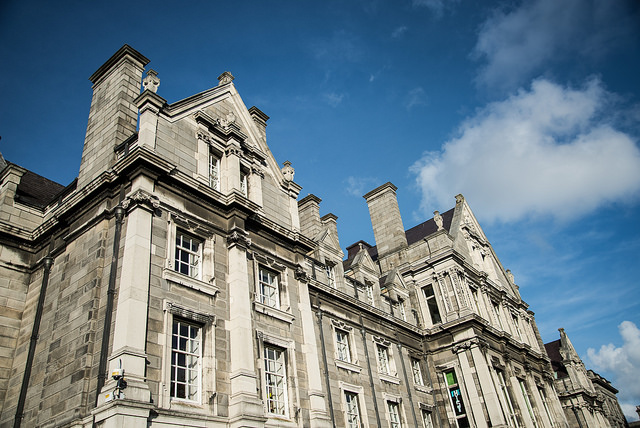Scholars have been told that giving up their campus accommodation next year will instead allow Trinity to rent out the rooms to non-EU students, boosting the College’s finances “at a time when international demand is at risk”.
In an email to Scholars on June 20th, their representative body, the Scholars committee, encouraged Dublin-based Scholars to consider the controversial request from the Registrar of Chambers, arguing that Scholars had “a special responsibility” to assist the College.
“Trinity College Dublin has seen many avenues of revenue curtailed owing to the current Covid-19 situation. Student accommodation remains an important source of revenue for the College,” the committee said.
The email came in the wake of a bitter dispute between the College and its Scholars, which arose after Trinity decided to restrict places in its on-campus accommodation to students from outside Dublin.
Not granting accommodation to Dublin-based Scholars would contravene the College’s statutes, which entitle Scholars to free rooms on campus for nine months of the year.
Trinity reacted angrily to a June 17th letter sent by the Scholars to the Provost, which protested the decision, and said that no Scholars would be denied free accommodation if they requested it.
The College said it was instead asking Scholars to relinquish their rights to accommodation “in light of the public health crisis”.
But the June 20th email sent by the Scholars committee suggests that Trinity’s desire to attract non-EU students was its primary motivation for the move, rather than public health concerns.
“Forfeiting this accommodation will enable the rooms to be rented out, subsidising the College’s finances. College has indicated that Campus accommodation is especially important in attracting non-EU students at a time when international demand is at risk”, it said.
The committee also said that the Provost and Registrar of Chambers Phillip Coleman had indicated that Trinity accommodation will continue to run at full occupancy over the coming year.
Up to 70 foundation scholars are part of Trinity’s body corporate, meaning the College is legally incorporated by “the Provost, Fellows, Foundation Scholars and other members of the Board”.
“As part of the Body Corporate, we hold a special responsibility to assist the College within the remit of the Statutes”, it added. “As such we encourage you to consider the Accommodation Department’s original proposal.”
In an email statement to The University Times, Thomas Deane, a Trinity media relations officer, said: “Scholars with Dublin home addresses were asked to consider giving up their entitlement to campus accommodation for the next academic year purely in the interests of public health.”
“At no point was this request made with financial motives in mind, and for clarity, any Scholar who was willing to forego their accommodation was to receive financial compensation for doing so.”
“The request was made to help students living outside Dublin secure accommodation in what are exceptional circumstances. It was not made to favour non-EU students nor was any such language used by the College at any point”, he added.
The amount offered to Scholars in lieu of accommodation was €2,215. On campus accommodation for first and second term, however, is worth approximately €8,300 a year.
In an email statement to The University Times, Secretary to the Scholars Felix Frank, who circulated the email on June 20th, said: “The college was not very forthcoming with details, so the Scholars’ Committee tried to put the decision into perspective for the affected students.”
“Trinity forced students to consider it by making forfeiting of accommodation the default option and asked that we encourage students to stick with that option”, he added. “Since we don’t know individual students’ circumstances we felt that consideration was the most we could ask for.”
Trinity has been grappling for weeks with the question of how best to reopen its accommodation amid ongoing social distancing regulations and fears about the spread of the virus.
Earlier this month, Prendergast told RTÉ Radio 1’s Drivetime that College is weighing up a “rotation system” next year, which could see students allowed to use shared kitchens on a rota.
In May, unpublished minutes seen by The University Times revealed a warning from Prendergast of the “need for students in College accommodation to do things differently by ensuring that kitchens and shared spaces are kept clean and tidy of all times”, as part of a plan to re-open Trinity’s accommodation “on a phased basis”.
In an email to applicants for College accommodation on Tuesday, Coleman said that residents of Trinity accommodation will not be allowed to have overnight guests or parties during the first term of next year in order to protect students’ health.
He added that students moving into Trinity accommodation from outside Ireland must also arrive by September 7th in order to comply with a mandatory two-week quarantine before term starts.
“In line with current Irish Government regulations, persons arriving from outside the island of Ireland (including Great Britain) must self-isolate for 14 days. Self-isolation means staying indoors and completely avoiding contact with other people”, Coleman said.
“This requirement may change before September”, Coleman said, “and we will be updating our guidelines in line with public health advice.”
“If you are arriving from a location outside Ireland you are currently asked to arrive at your assigned College accommodation no later than 7 September 2020.”
Students who are required to self-isolate upon arriving in Ireland must contact the Accommodation Office to confirm their arrival date. Students who already live in Ireland will be assigned a specific day and time to arrive in order to avoid large gatherings of people.
Update: 16:21, July 3rd, 2020
This piece has been updated to include a statement from Thomas Deane, a Trinity media relations officer.







